(Works in Indian ink, Indian ink wash, gouache, marker & pencil)
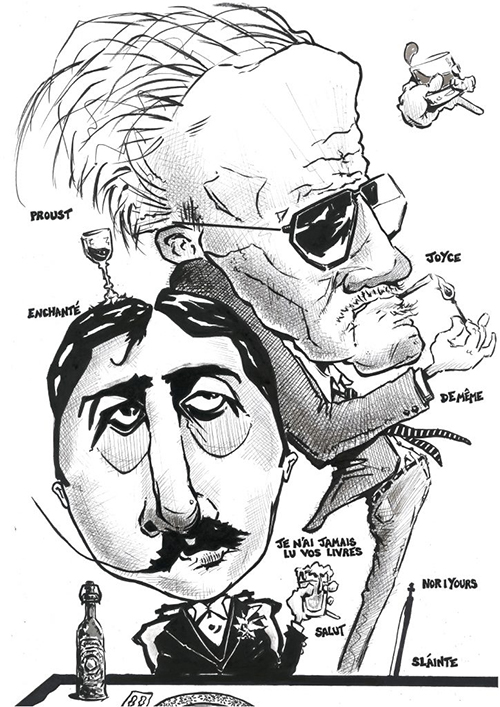
James Joyce famously met Marcel Proust at the Majestic Hotel, Paris, in 1922, not long before Proust’s death. By all accounts Joyce was drunk, but there was little to no agreement on just what two of the century’s greatest writers discussed (apart from it being very little and generally banal). Neither had ever read the other’s work. In the above illustration, Proust’s ‘Salut” (rather than the expected ‘Santé’) and Joyce’s deafness to the solecism accentuates the complete lack of interest each held for the other. Irish art critic and friend of Joyce, Arthur Power observed: “Here are the two greatest literary figures of our time meeting and they ask each other if they like truffles.” Except that they probably did not, because no one account of their brief exchange jibes with another.
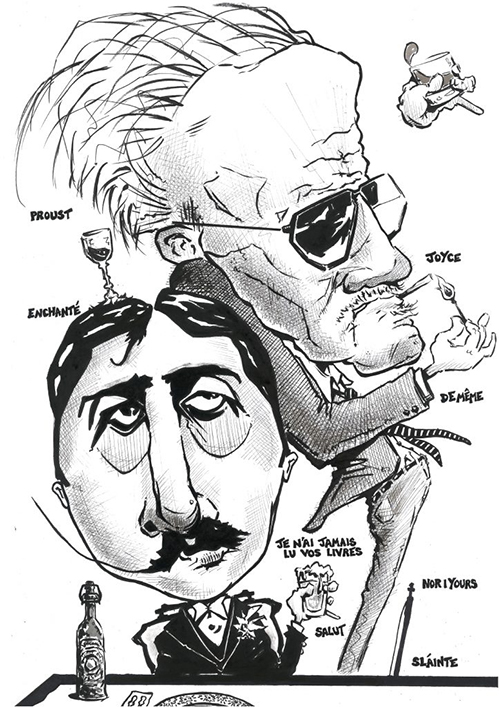
PROUST
James Joyce famously met Marcel Proust at the Majestic Hotel, Paris, in 1922, not long before Proust’s death. By all accounts Joyce was drunk, but there was little to no agreement on just what two of the century’s greatest writers discussed (apart from it being very little and generally banal). Neither had ever read the other’s work. In the above illustration, Proust’s ‘Salut” (rather than the expected ‘Santé’) and Joyce’s deafness to the solecism accentuates the complete lack of interest each held for the other. Irish art critic and friend of Joyce, Arthur Power observed: “Here are the two greatest literary figures of our time meeting and they ask each other if they like truffles.” Except that they probably did not, because no one account of their brief exchange jibes with another.

Sumner was the Secretary of State for the Suppression of Vice (New York) and was a key figure in obstructing the early publication of Ulysses in America. His words here form a direct quote. Pound’s words are from a letter to Joyce on the issue.

This exchange between the two writers is taken directly from Lewis’s account of their discussion with regards Joyce’s character. Here, Joyce is fittingly modelled after Sir Thomas Lawrence’s great painting of Satan/Lucifer, now on permanent display at London’s Royal Academy. However Joyce’s headgear in this image differs markedly from Satan’s in the painting: it is the Latin quarter hat favoured by the young, self-consciously bohemian Joyce in Paris. (In the Telemachus episode of Ulysses, Mulligan throws Stephen the hat as they prepare to depart the Martello tower for the day. And in the Proteus episode Stephen reflects on his Parisian days and affected sartorial habits: “My Latin quarter hat. God, we simply must dress the character. I want puce gloves.”)
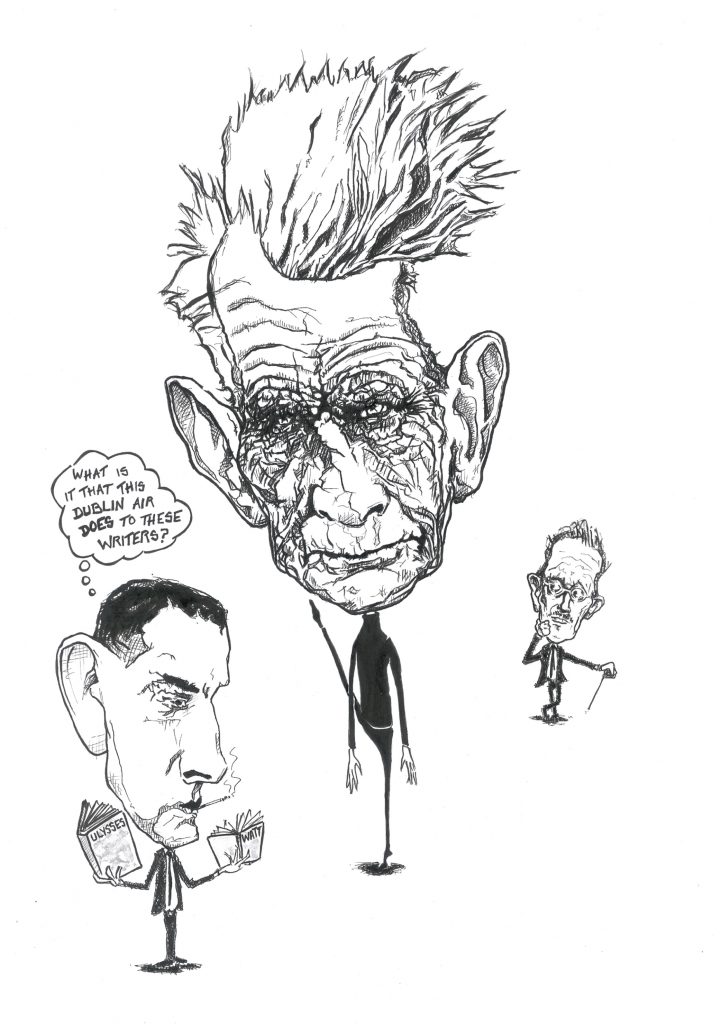
The publisher Frederick Warburg – best known for championing George Orwell – reputedly uttered these words concerning Beckett’s novel Watt, which he did not take on … a decision he perhaps soon came to regret. Beckett had very little to say about Joyce’s Ulysses – “a piece of virtuosity upon which it does not seem possible to improve” in the words of the critic Hugh Kenner. But as Kenner went on to observe: “Beckett’s first step … was to commence where Ulysses left off, with the comedy of inventory. … He does this in Watt … and Watt’s point of departure is the Ithaca episode of Ulysses [in which] Joyce produces the great scientific catechism, in which all empirical data of the book get revolved before the reader.” (The Stoic Comedians, 1964.) And so Beckett has Watt advance “due east” by turning “his bust as far as possible towards the north and at the same time to fling out his right leg as far as possible towards the south, and then to turn his bust as far as possible towards the south and at the same time to fling out his left leg as far as possible towards the north” (and so on), in direct homage to Leopold Bloom’s entry into his house. (No wonder Warburg was confounded.)
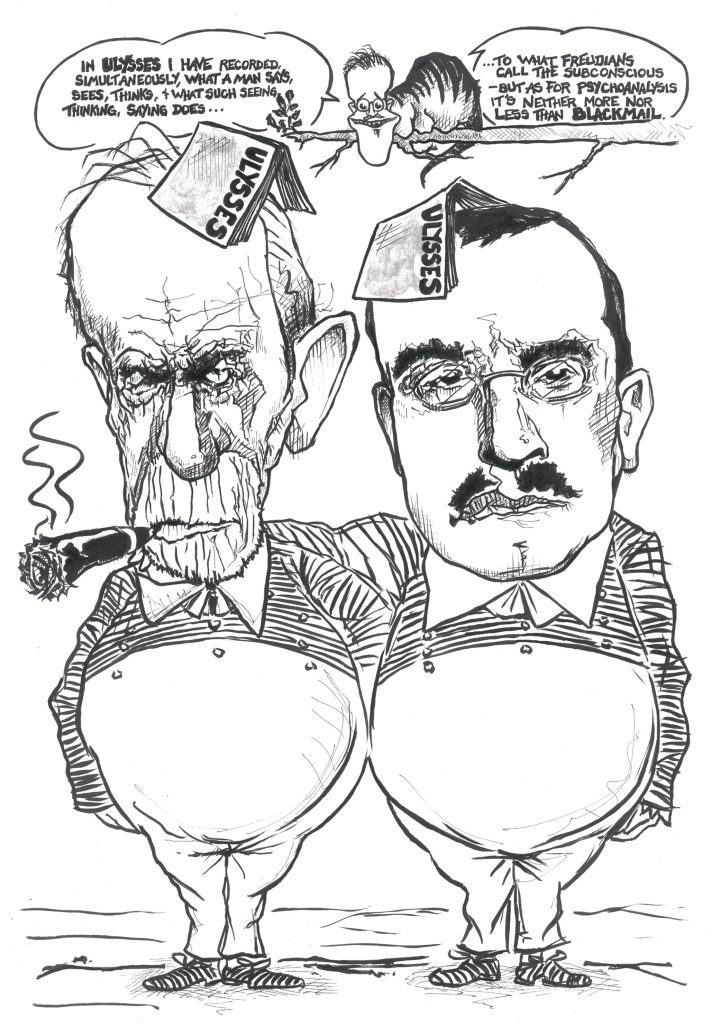
Carl Jung wrote a less than kind introduction for a German edition of Ulysses which, though never published, did little to endear him to Joyce and his circle. Joyce referred to Jung as the Swiss Tweedledum to Freud’s Viennese Tweedledee, and had little public time or respect for psychoanalysis. However, his private correspondence reveals a playful interest in its application to his own life and dreams. In later years, Joyce would develop great esteem for Jung for the latter’s treatment of his daughter Lucia.
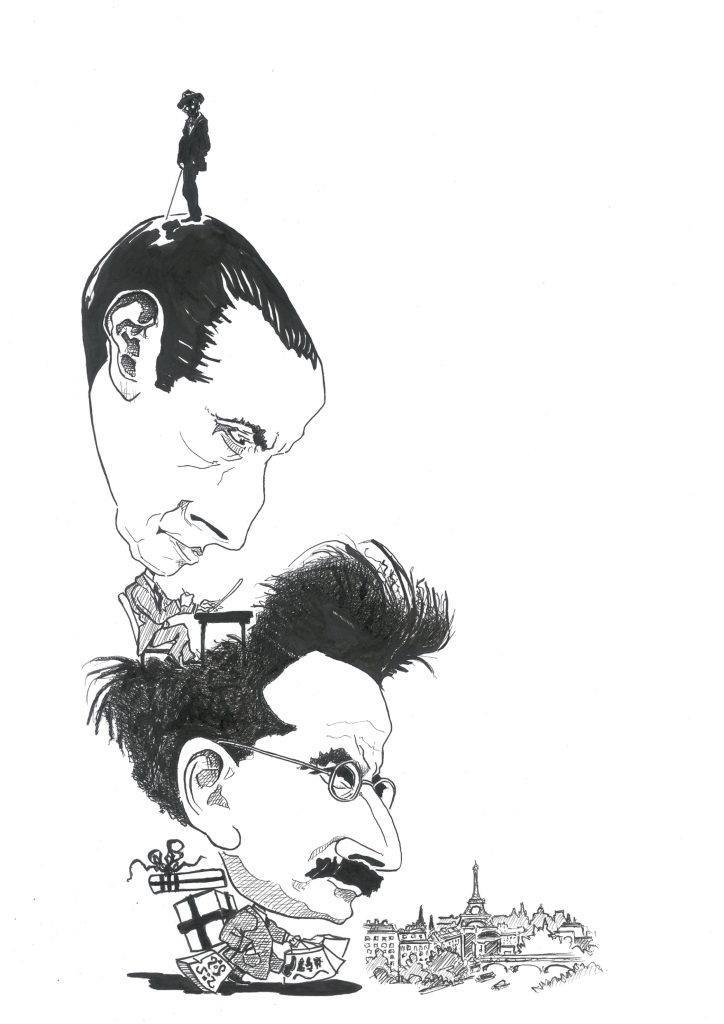
As Catherine Flynn writes, with reference to her recent book, James Joyce and the Matter of Paris (CUP 2019): “Joyce’s work illustrates the power of literature as social critique and counterforce. His writing impacted on his French contemporaries in crucial ways that have gone unnoticed. … It was in this milieu that he met the young writer Louis Aragon who was inspired by the Circe chapter to write the first Surrealist novel, Paysan de Paris, or Paris Peasant. Aragon’s novel in turn prompted the Frankfurt School theorist Walter Benjamin … to begin his Passagen-Werk or Arcades Project, a huge study of the impact of capitalism on the city. Aragon’s and Benjamin’s works develop in different ways Joyce’s exploration of the capacity of sensory experience to resist the pressures of capitalism and to lead to an awareness of social truths.” (The Irish Times, Wed. Nov 6. 2019.)
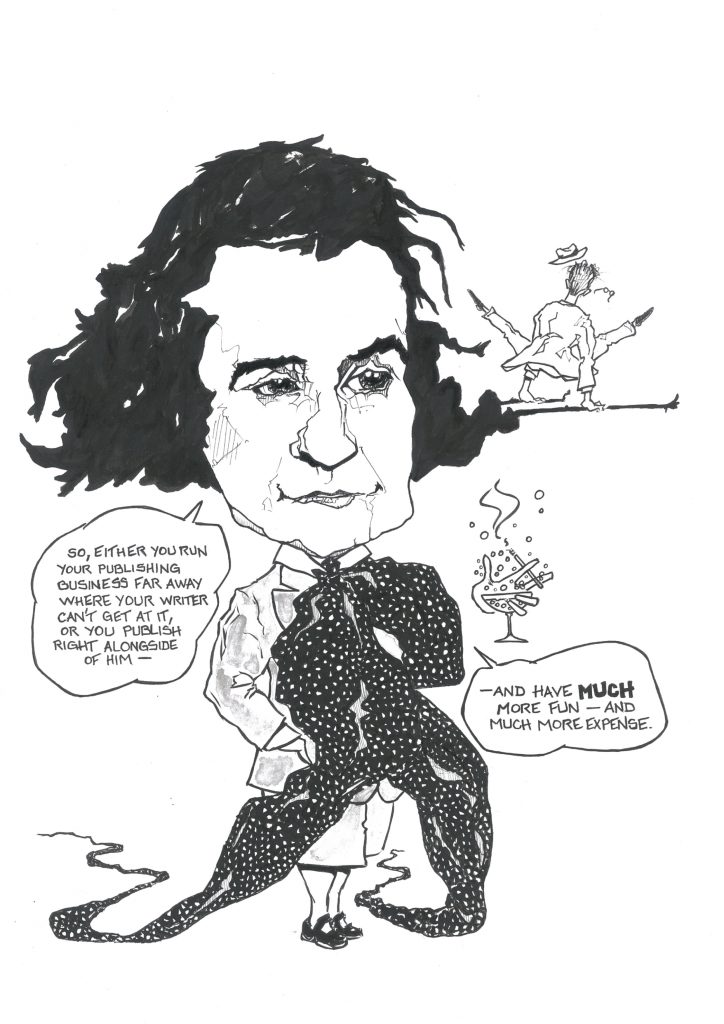
Original publisher of Ulysses, Sylvia Beach is no longer the once unsung hero(ine) of the James Joyce saga, given the recent studies devoted to her, not least Noel Riley Fitch’s excellent Sylvia Beach And The Lost Generation (1983), as well as her own book Shakespeare and Company, and published correspondence. Praise and celebration of Sylvia Beach cannot be sung loudly enough, so integral was she to the successful launch and reception (however turbulent) of Joyce’s Ulysses. Her intelligence, resolve, perseverance, tolerance and finally her kindness must never be forgotten.
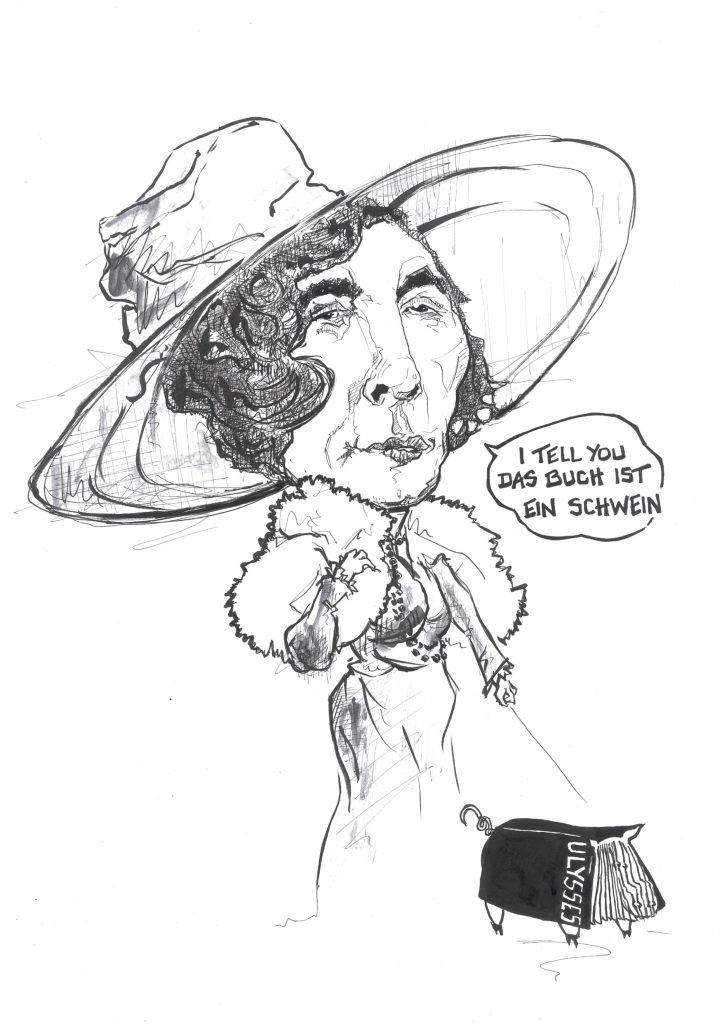
Joyce’s quick-witted, no-nonsense wife finally got a biography of her own in the form of Brenda Maddox’s Nora. Here, her words are those cited in Richard Ellmann’s biography of Joyce: “Generally, as Budgen and Suter observed, Nora handled Joyce as if he were still half a child, and his book as if it were child’s play of a rather disgusting kind. Once when they came to call she greeted them with the words, ‘My husband is writing a book; I tell you [this for the benefit of Suter, whose English, like her German, was poor] das buch ist ein Schwein.'”
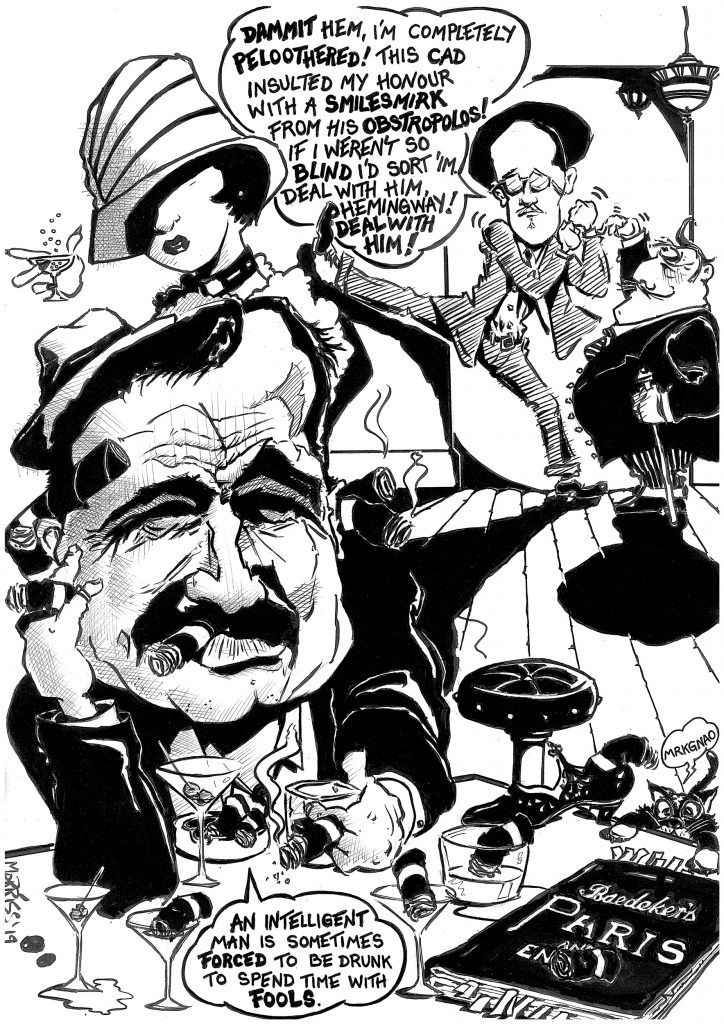
At times, when drunk, a sometimes prickly Joyce would call upon his occasional drinking buddy Hemingway to “deal with” his potential (and often imagined) assailant. Joyce’s neologisms here are his own. The cat’s ‘miaow’ is the cat’s cry in Ulysses (…on which Bloom reflects: “They call them stupid. They understand what we say better than we understand them.”).
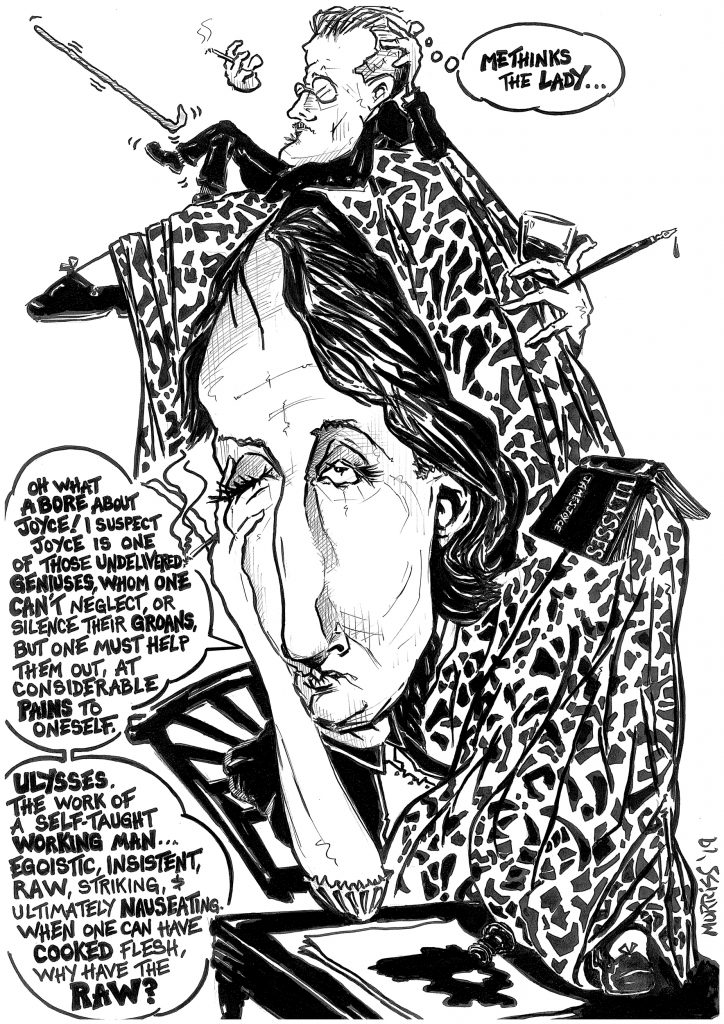
It is well documented that Woolf struggled with Ulysses (as well as with Joyce himself – snobbery was a factor) and confessed to finding the book something of a boring slog. But some scholars are in agreement that much of that was down to sheer jealousy, as Woolf wanted to be the one spearheading the modernist movement with her work, specifically – at this time – “Mrs Dalloway In Bond Street” (as it was known before publication). All of Woolf’s words here are from her letters.
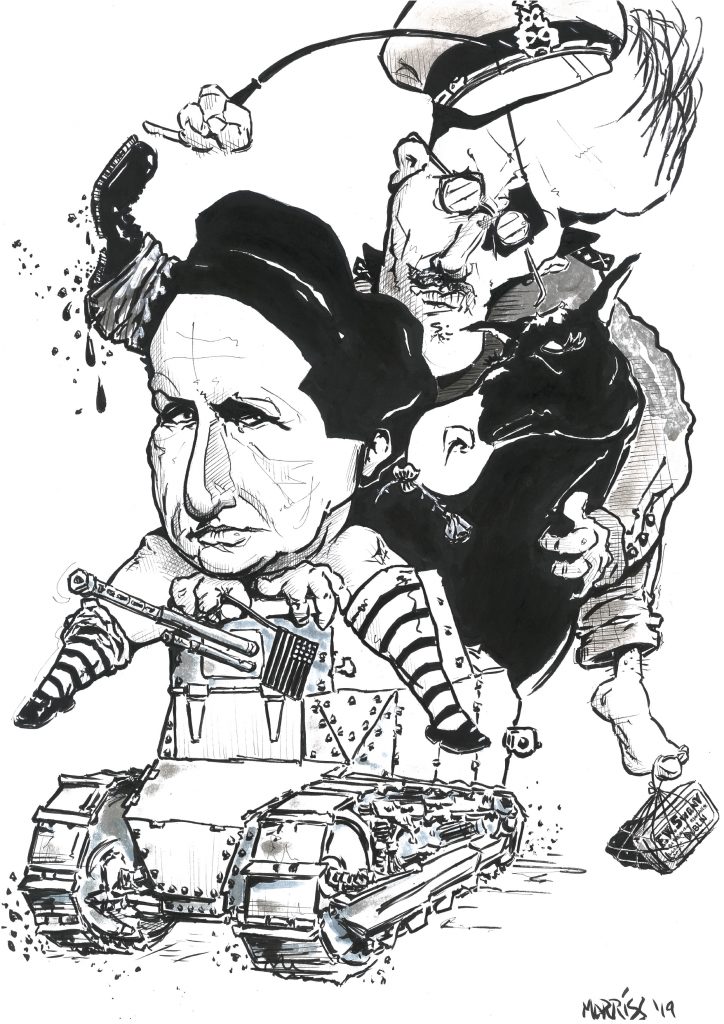
“(Stein) did not want to talk about Anderson’s works any more than she would about Joyce. If you brought up Joyce twice, you would not be invited back. It was like mentioning one general favourably to another general.” – Ernest Hemingway, A Moveable Feast. Suspended from ‘General’ Joyce’s big toe is a black potato (a nod to Bloom’s good luck charm) and a bar of lemon soap which Bloom picks up at Sweny’s pharmacy with the promise to pay Mr Sweny later, which he fails to do. (The soap appears further on in Ulysses in the hallucinatory Circe episode and declaims: “We’re a capital couple are Bloom and I;/He brightens the earth, I polish the sky.”)
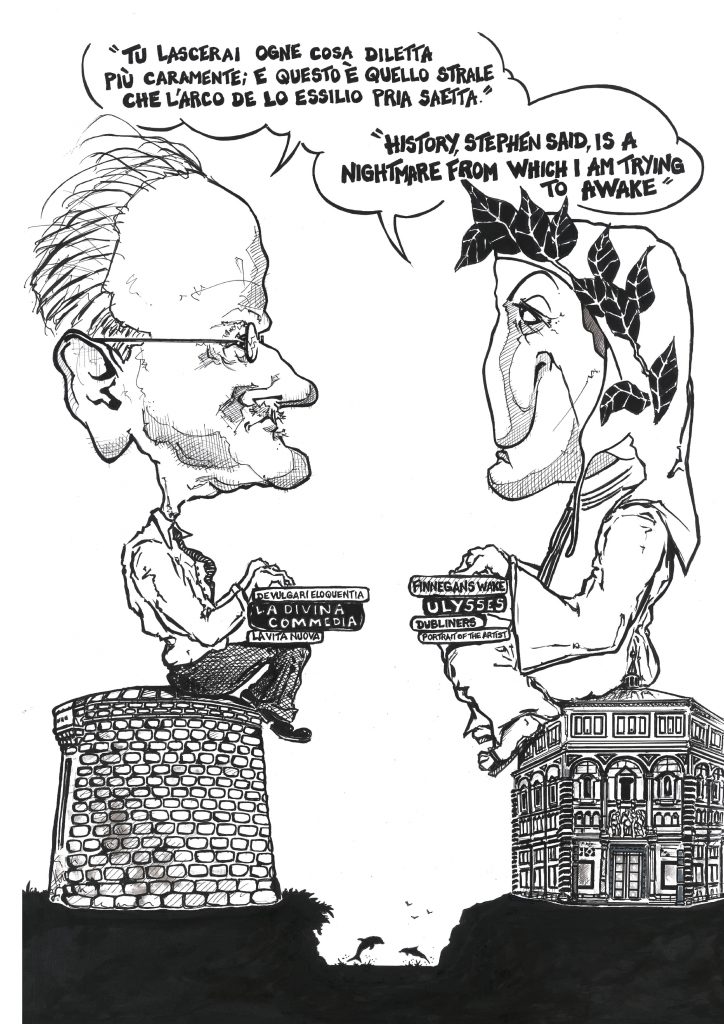
Dante’s caricature here is inspired by Botticelli’s famous painting of the poet. Joyce revered Dante and issues of exile plagued them both. Dante is seated on the Baptistery of St John, Florence; Joyce on the Martello tower in Dublin, with which Ulysses opens. Each quotes from the other’s greatest work on the question of exile. The Italian reads: “You shall leave everything you love most dearly; this is the arrow that the bow of exile shoots first.” (As uttered in Paradiso 17 by Cacciaguida.)
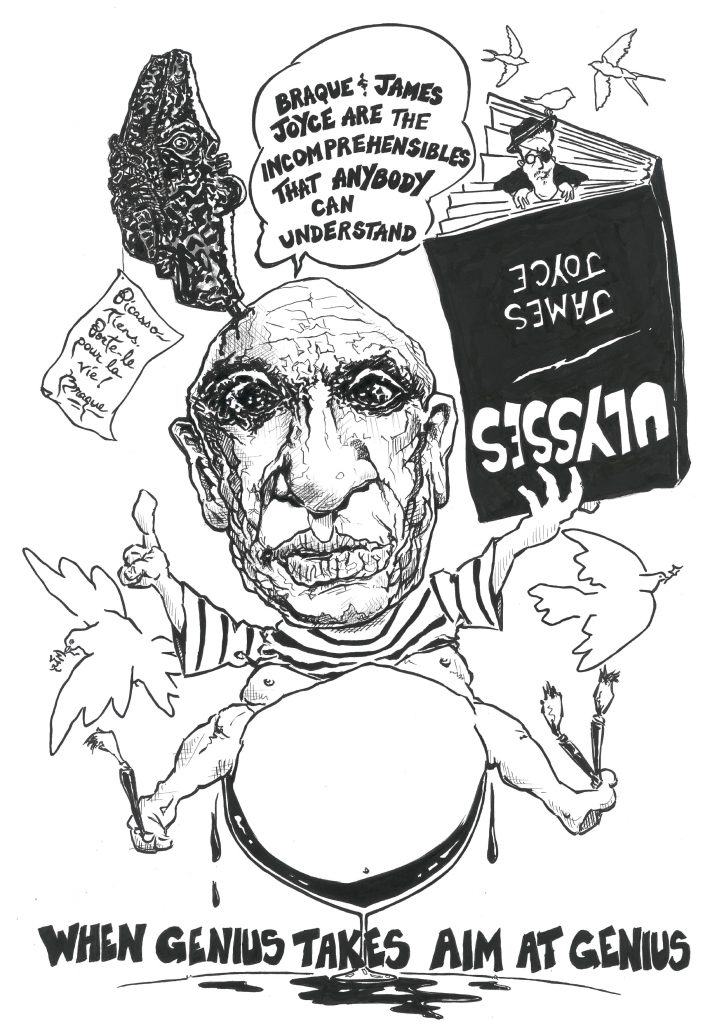
Picasso could be famously sharp towards anyone he considered a rival.
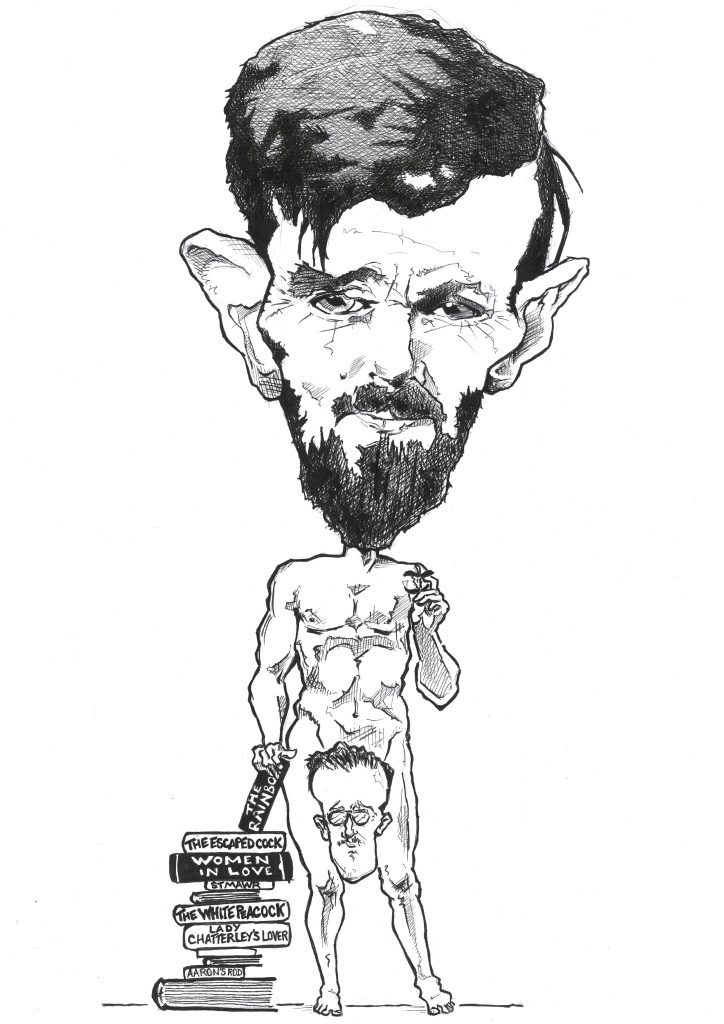
Lawrence’s pose is modelled after that of Adam by Italian Renaissance artist and sculptor Tullio Lombardo. Lawrence thought Joyce’s treatment of sex regressive, hence the fig leaf is here replaced with an image of Joyce’s head. A stack of Lawrence’s best-known titles (and those most concerned with the vital issue of sex as he struggled to address it) is substituted for the biblical Tree of Knowledge. Unlike Adam’s, the apple Lawrence holds has been eaten to the core.
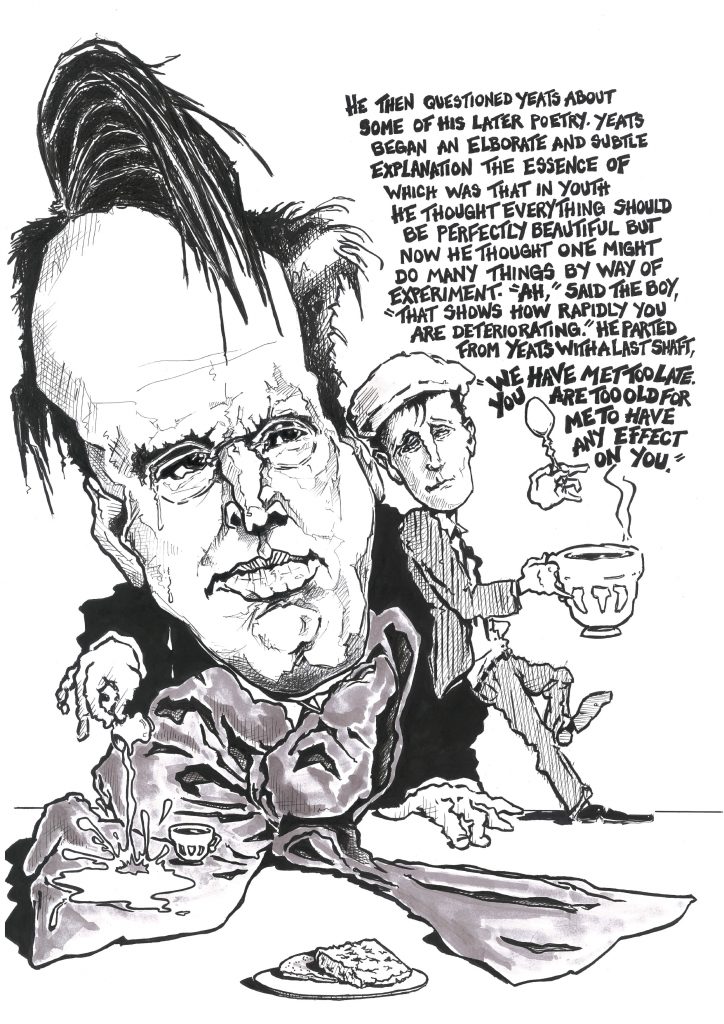
The quote here is taken directly from George Russell’s account of the meeting between a very young Joyce and the much older Yeats. The story is somewhat apocryphal but lives on. The gorgonzola sandwich on the table is a nod to one of Leopold Bloom’s favourite meals at the Davey Byrnes pub in Dublin, still served today.
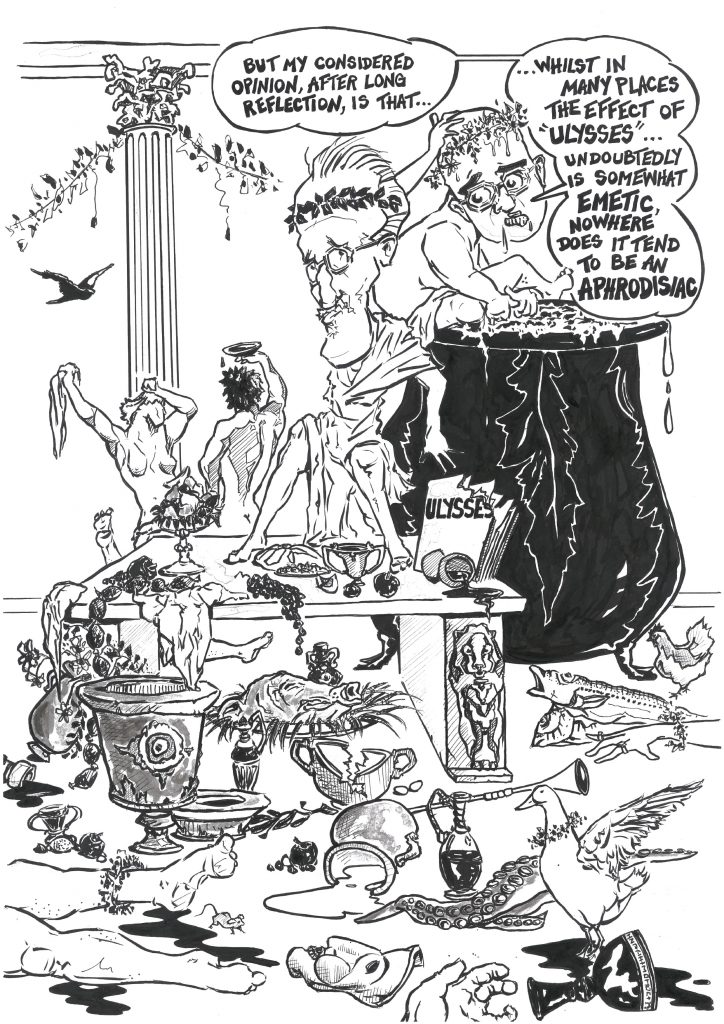
In America, Judge Woolsey ruled that Ulysses was not pornographic, clearing the way for its publication in the United States. Woolsey’s words are still considered witty today. Here, the setting of a debauched Roman banquet serves Woolsey’s sentiments well. Joyce’s face has been suitably ‘Romanised’.
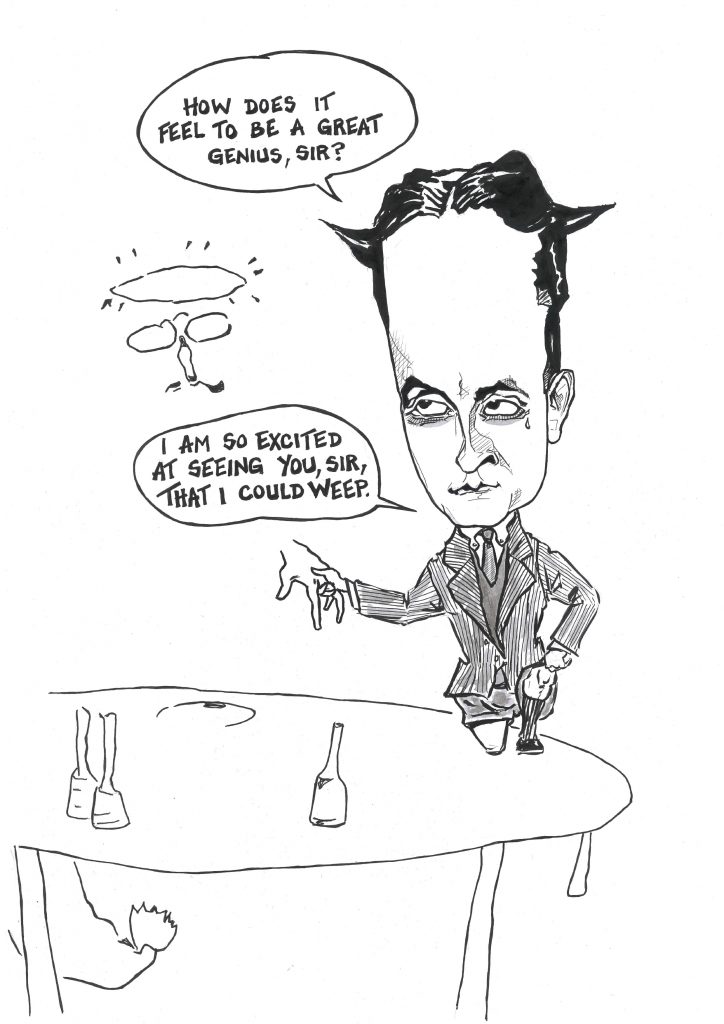
Fitzgerald considered Joyce an absolute genius and personal hero. At a dinner party hosted by Sylvia Beach, he got down on one knee and pronounced these words. He also drew a childish sketch of Joyce and the table, with Beach and her partner as mermaids, their tails stretched out beneath the table, reproduced – with some liberty – here.
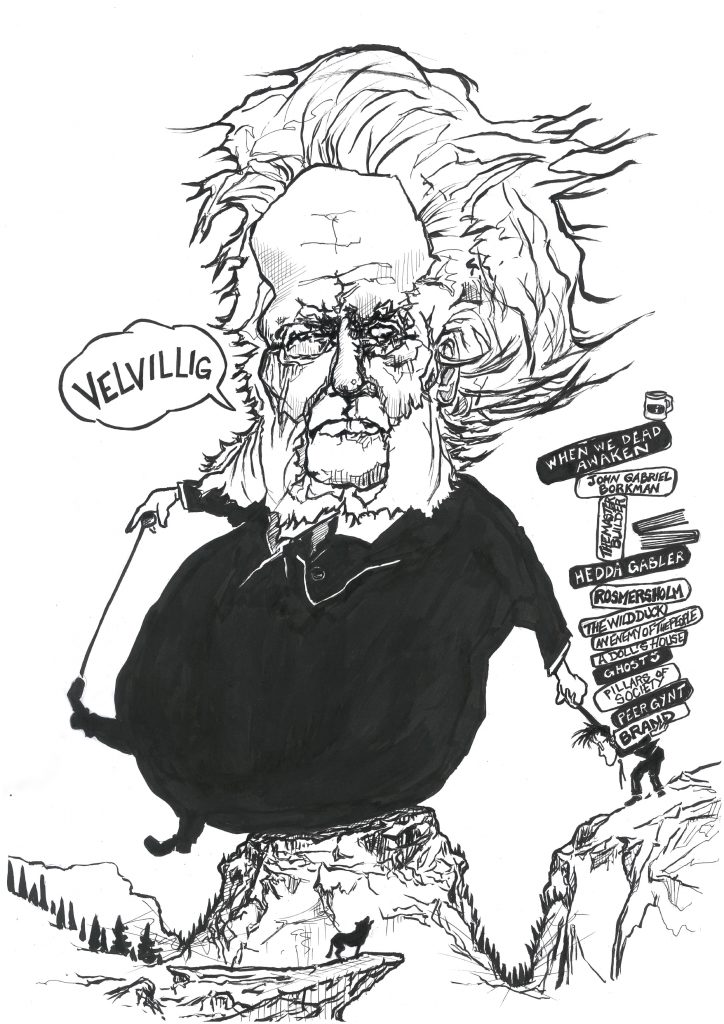
A very young Joyce wrote to Ibsen setting out his reasons for considering him one of the greatest writers of his time. Ibsen replied through his British agent. The Norwegian means “generous” or “benevolent”, as he described Joyce’s praise and esteem.
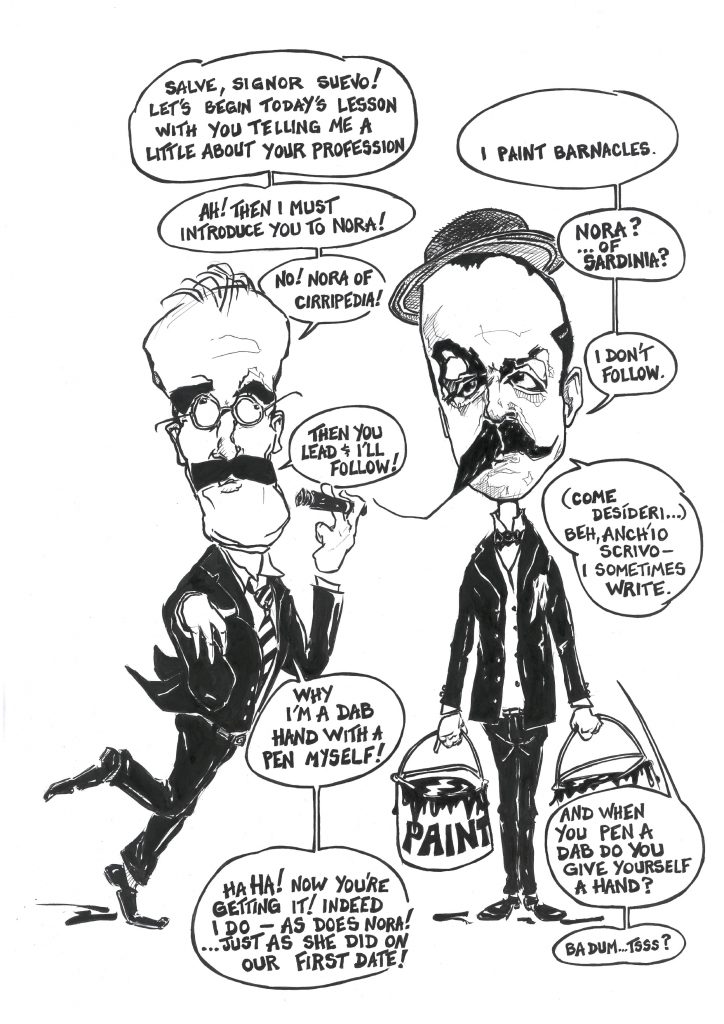
Joyce gave the much older Italian writer English lessons at the Berlitz school in Trieste. At the time, Svevo had had very little success as a writer and was working for his father-in-law’s ship painting company, which supplied marine paint for barnacles, hence the childish riff here on Nora Barnacle’s name and old film comedy, with Joyce playing the role of Groucho Marx (whom he would reference later in Finnegans Wake).
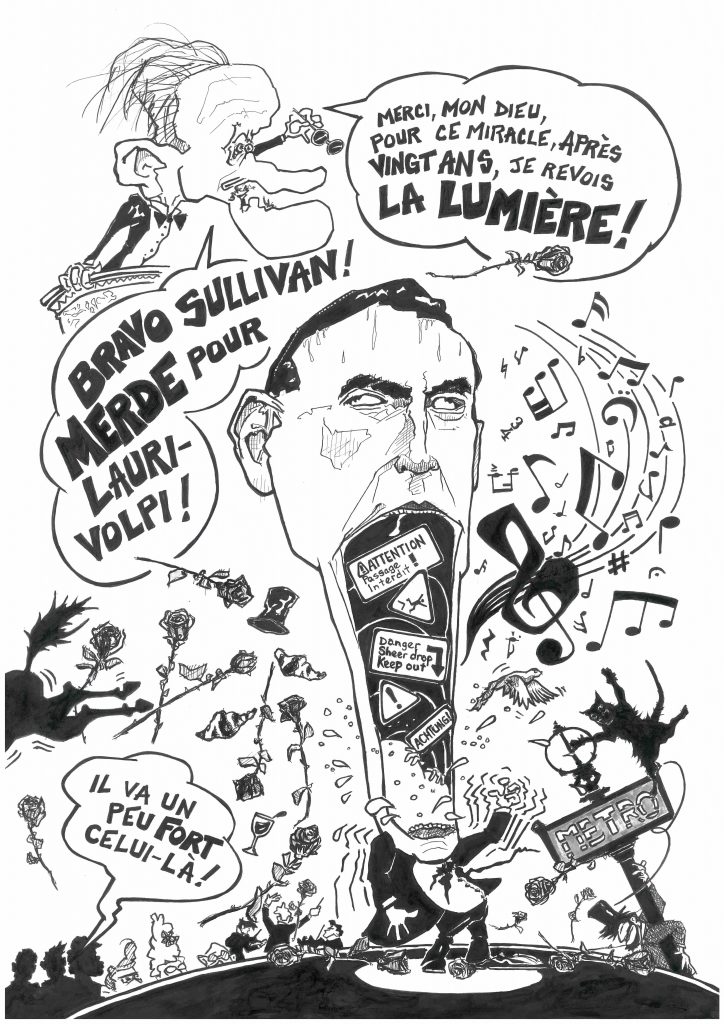
Joyce’s great esteem for – and, some might say, his irrational obsession with – the Irish tenor John Sullivan, inspired him to promote the latter in a series of odd and sometimes chaotic ways (as illustrated here with self-indulgent exaggeration). At a Sullivan-starring performance of Guillaume Tell at the Paris Opéra, Joyce shouted the above words (and two very different sentiments, slightly conflated in time in this drawing) in a calculated ‘gesture’ to bring as much notoriety to both the evening and the singer’s performance. It worked. The press reported the incident. Ellmann recounts how Joyce next went on to put pressure on Sir Thomas Beecham through none other than Nancy Cunard, whom he had never before met, to promote Sullivan’s career.
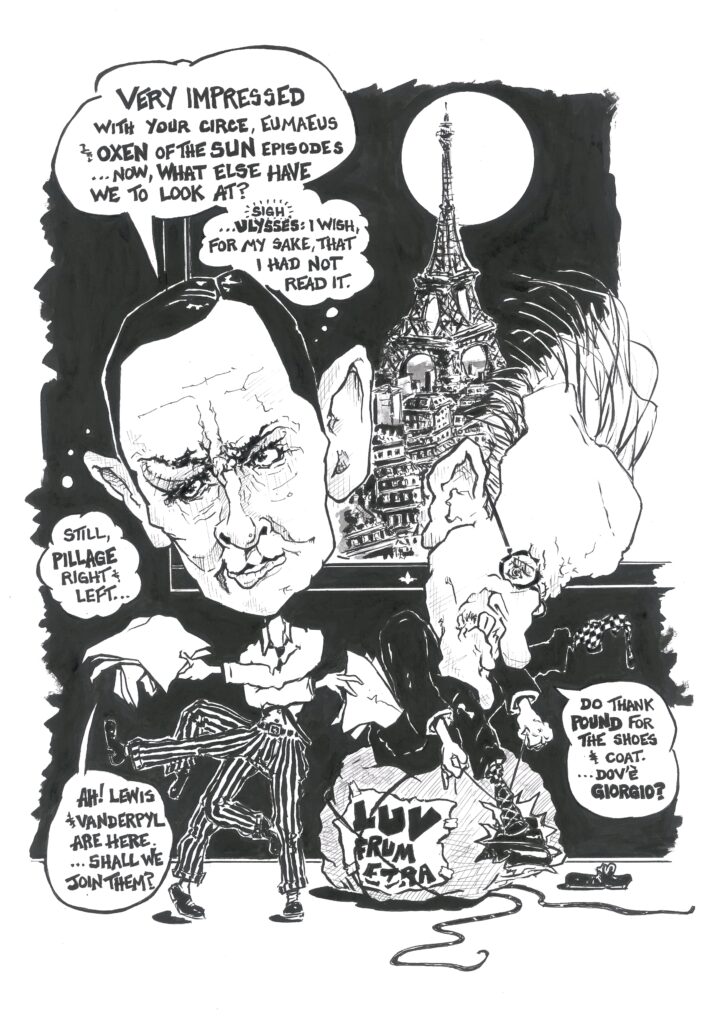
Eliot greatly admired Joyce (with some reservations) and read ‘episodes’ from Ulysses long before it was published. Eliot presented Joyce with a gift of shoes and a coat from Ezra Pound, just prior to dining with him and Wyndham Lewis and the editor Fritz Vanderpyl in Paris. Most of Eliot’s words in the above illustration are taken from his letters – not to forget the famous (and often mis-quoted) line from his essay on Massinger: “Immature poets imitate; mature poets steal.” Eliot loved to dance, particularly the Foxtrot, for which he can perhaps be seen limbering up here.
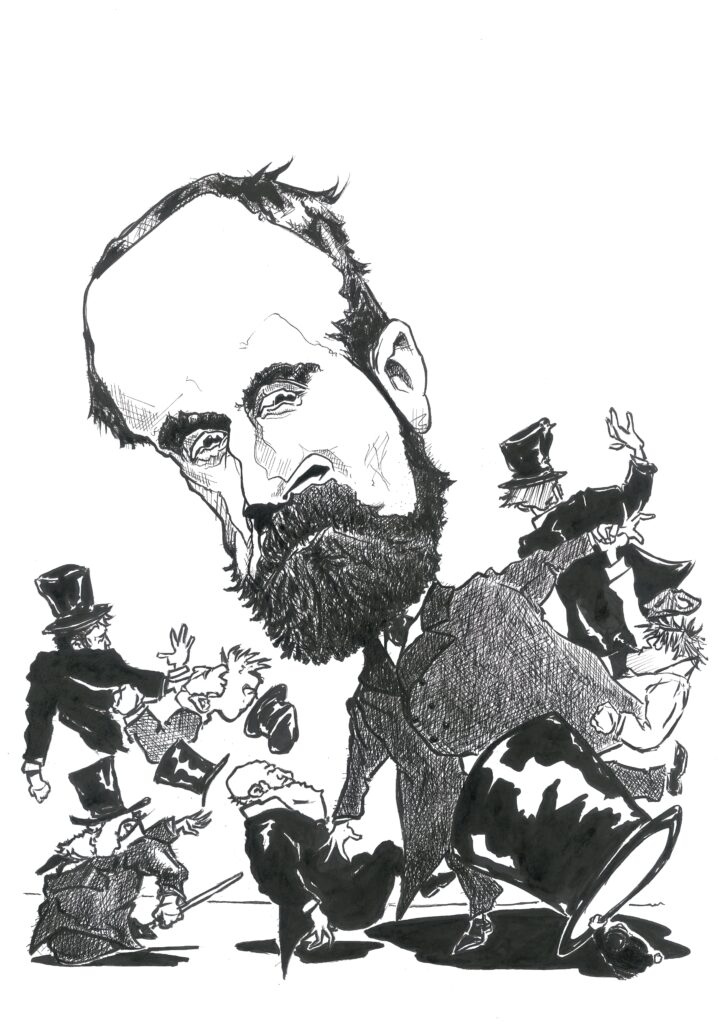
Parnell was a hero in the fight for Irish Home Rule until brought down by his affair with the separated but still legally married Katharine ‘Kitty’ O’Shea. Joyce revered Parnell and never forgave his fellow countrymen for what he considered their betrayal of a great man. When only nine years old Joyce penned Et Tu, Healy, soon afterwards published by Joyce’s proud father, no admirer of the Catholic Church and its role in Parnell’s downfall (Tim Healy was Parnell’s presumed betrayer to the Church). Heated discussions about Parnell occur in Joyce’s Dubliners and Portrait. In the Eumaeus episode of Ulysses, Bloom briefly recounts how he returned Parnell’s hat to him in a scuffle: “He saw him once on the auspicious occasion when they broke up the type in the Insuppressible or was it United Ireland, a privilege he keenly appreciated, and, in point of fact, handed him his silk hat when he was knocked off and he said Thank you, excited as he undoubtedly was under his frigid exterior notwithstanding the little misadventure mentioned between the cup and the lip: what’s bred in the bone.”
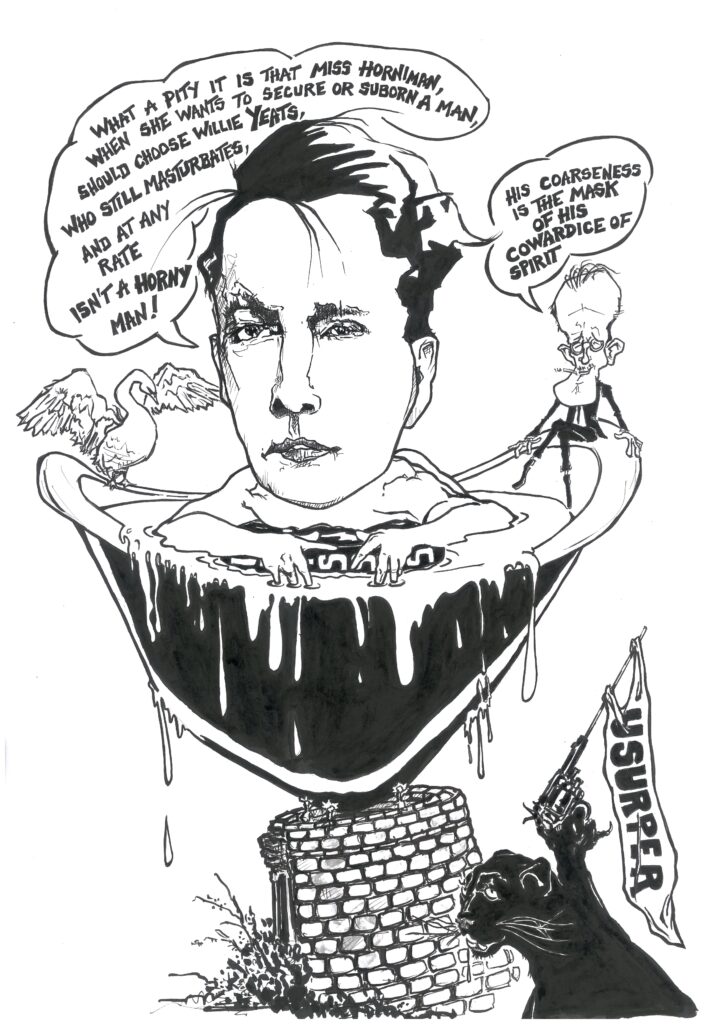
Joyce’s nemesis, Gogarty took aim at many more besides – some famous, others little known. Yeats was among those whom Gogarty targeted, as here, despite winning Yeats’s backing on the Dublin poetry scene and Yeats’s inclusion of 17 of Gogarty’s poems when he was editing the 1935 Oxford Book of Poetry. Joyce considered Gogarty crass, crude, fantastically vain, deeply shallow and finally forever intolerable after an incident in the Martello tower in which Gogarty fired a pistol above a sleeping Joyce’s head to placate another guest, Dermot Trench, who had fired the gun shortly before in the course of a nightmare about a black panther. In Ulysses, Buck Mulligan is based on Gogarty, and the Telemachus episode ends with Stephen calling Mulligan “Usurper”. However fractious their relationship, Joyce had Gogarty’s book I Follow Saint Patrick next to his bed on the night he died; and whatever Gogarty’s accomplishments (…he is still remembered and celebrated in Ireland to this day), his global fame largely rests with Joyce’s portrayal of him in Ulysses. Hence, in the above illustration an eternally young, immature and narcissistic Oliver floats and gloats on a Ulysses Lilo. In Mrs Spendlove, Gogarty wrote: “[Joyce] paid me the only kind of compliment he ever paid, that is to mention a person in his writings, he described me shaving on the top of the tower. In fact, I am the only character in all his works who washes, shaves and swims.” Joyce’s words here are taken from his Trieste journal.

In his Joyce biography, Richard Ellman recounts how Yeats arroused Joyce’s jealousy by praising Synge’s play Riders to the Sea and describing it as quite Greek. Joyce in fact addressed the above words to his brother Stansilaus. As for Synge not being an Aristotelian (Ellman writes): “This corner Joyce had for himself, and he proceeded to point out to Synge the play’s Aristotelian defects. In particular he objected to its catastrophe, because it was brought about by an animal (a pony) rather than by the sea, and to its brevity. It was, he said, a tragic poem, not a drama.” (The pony’s words here are pure speculation.)
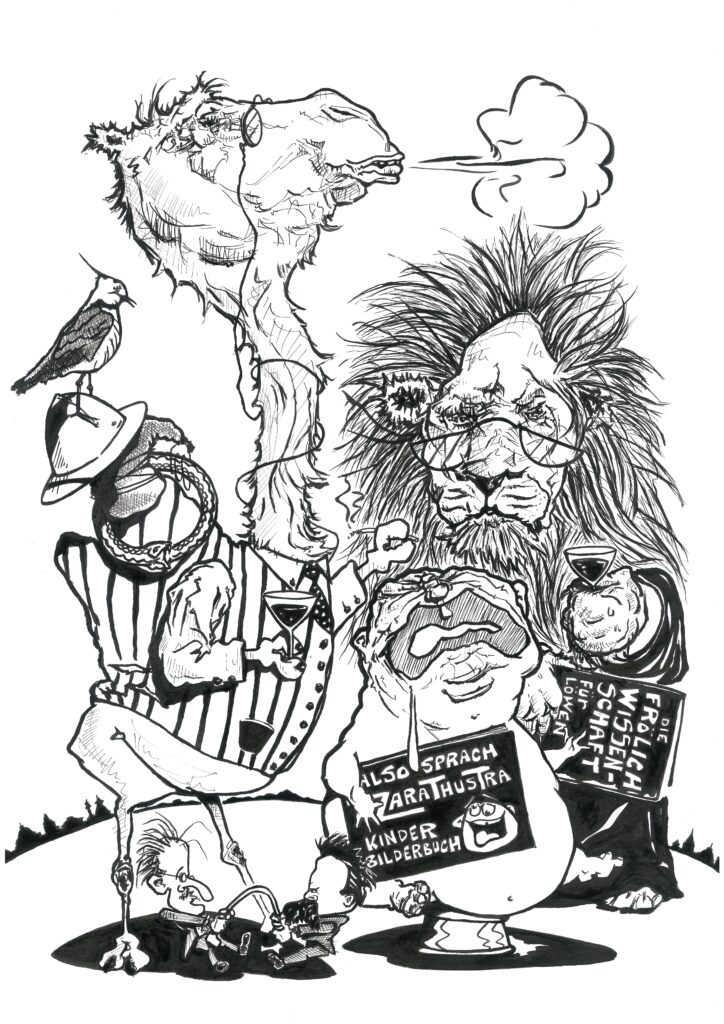
Camel. Lion. Child. …And a relatively diminished Joyce and Nietzsche tugging on the ‘wishbone’ of Adam’s rib. As Nathan Miller writes (‘Reading Nietzsche in James Joyce’s Ulysses’): “Joyce’s attraction to Nietzsche has at best received little attention in scholarship, though the familiarity of the former with the latter is evident in Ulysses, Dubliners and elsewhere.” In the Telemachus episode of Ulysses, Buck Mulligan declares: “My twelfth rib is gone … I’m the Uebermensch.” One rib down, Mulligan is Adam, and as the Übermensch he is the Nietzschean Overman who vanquishes the now moribund and once soul-sapping legacy of Christian ethics and metaphysics. In Also Sprach Zarathustra, Nietzsche addresses the transformation necessary to overcome the nihilism of a dead spiritual heritage, from camel (beast of burden) to lion (beast of might), and finally to a child. Nathan Miller again: “Why must the lion become a child? Because the child is a new beginning, a forgetting, a first movement, a game … a ‘sacred Yes-saying,’ Zarathustra says. The child encounters the world from a fresh perspective, it does not remember the old values, and thus it is not bound to think of the world as the lion and camel did.” … Shortly after his initial Nietzschean outburst, Mulligan adds: “He who stealeth from the poor lendeth to the Lord. Thus Spake Zarathustra” (… thereby twisting and subverting Proverbs 19:17: “He that hath pity upon the poor lendeth unto the Lord”).
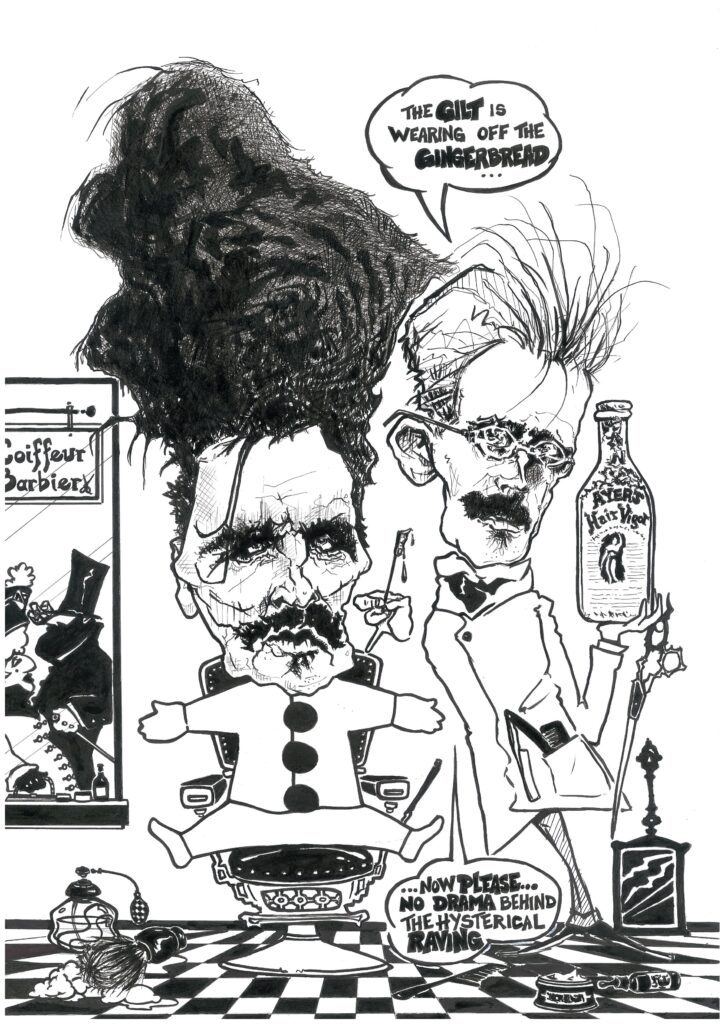
These two distinct comments made by Joyce about Strindberg – here so forcibly yoked together for comic effect (i.e.: a cheap gag) – belie the possible larger influence Strindberg had on Joyce. Certainly Joyce read most of any Strindberg available to him, just as he attended several stagings of his plays. But the once generally accepted notion that Joyce then summarily dismissed and even forgot him is no longer credible. In his short essay, ‘A Schoolmaster’s June Day Walk round the City: Joyce and Strindberg’s Albert Blom’ (Studia Neophilologica 61:183-192, 1989), William Sayers considers Strindberg’s pseudo-autobiographical account of his marriage to Siri von Essen, Le plaidoyer d’un fou, which Joyce owned in English translation. The hero of the Plaidoyer, Axel, refers to his collection of short stories. Sayers writes: “… Strindberg said of the stories, which were his own … that they dealt with marriages and concubinages … and … with women’s issues. They also document the effects on the spiritual development of young men and women of a repressive state church and hierarchical social system. … The central episode of the [first] story recounts how a young schoolmaster spent Midsummer Day moving from one quarter to another in the city of Stockholm. … The above superficial resemblances between the story and Ulysses … and the availability of the work are then sufficient prima facie evidence for inquiring whether Joyce could have drawn on Strindberg’s story for one or more strands in the creation of Stephen Dedalus’ and Leopold Bloom’s June 16 in Dublin.”
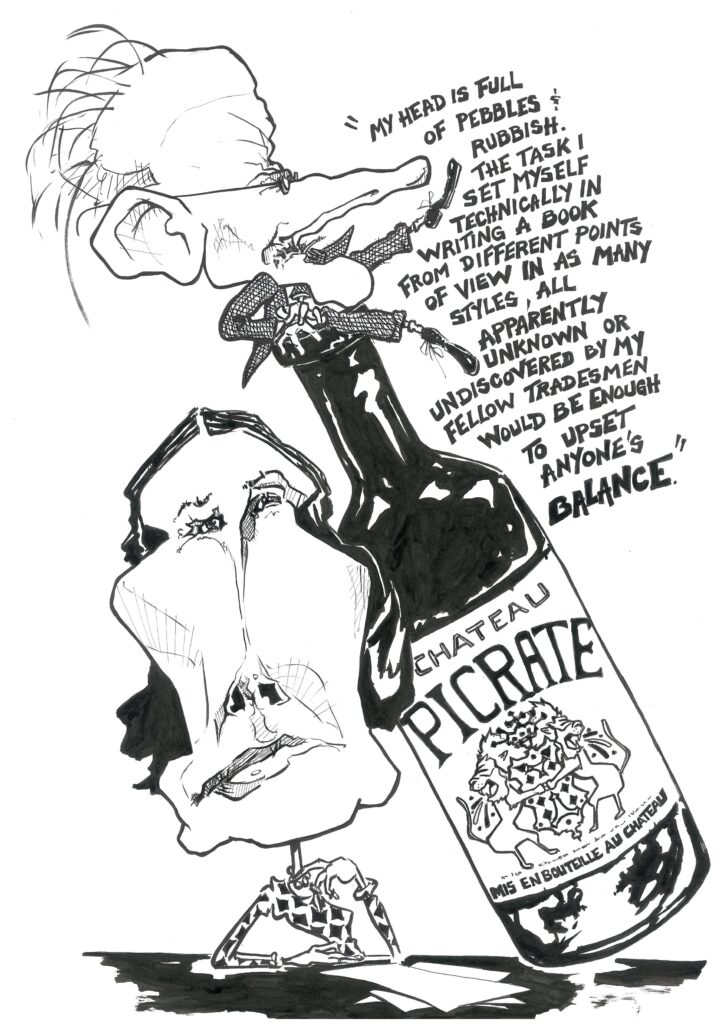
One of Joyce’s most loyal (and longest suffering) supporters, Weaver was a wealthy English feminist and editor of The Egoist, who bankrolled Joyce and his often dissolute lifestyle (compared with her own). She was a firm champion of writers in the face of censorship from puritanical printers and she serialised Joyce’s Portrait of the Artist as a Young Man in The Egoist for which she paid him £50. Wrote Joyce: “It is very kind of you to take so much trouble in the matter.” And he continued to write to her over the years in fairly intimate terms on the state of his health, finances and Ulysses. Wyndham Lewis informed Weaver of Joyce’s lavish lifestyle (far exceeding his means) and his frequently drunken behaviour, of which she did not approve. She wrote to Joyce on the evils of alcohol, which left him devastated. But Weaver continued to support Joyce financially and emotionally and published the first English (Egoist) edition of Ulysses. She was not a fan of his Work in Progress (later Finnegans Wake) but this did not impede her support, writing to Joyce in 1926: “It seems to me that you are wasting your genius. I daresay I am wrong.” On news of Joyce’s death on 13th January 1941, Weaver sent Nora £250 to cover funeral expenses and she continued to support his family and legacy in the years to her own death in 1961. Joyce’s words here are taken from his letter to Weaver dated 24 June 1921.
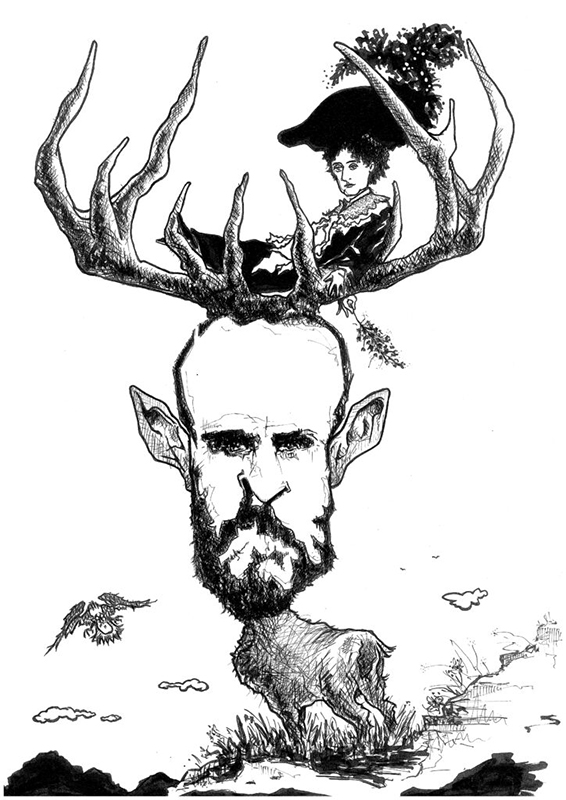
As Ellman points out, hunting metaphors were rife following Parnell’s downfall: “But soon the pressure of Davitt, of Gladstone, of the Catholic bishops, and then of Tim Healy and other close political associates accomplished its purpose and, as Yeats put it, ‘dragged this quarry down.’ The metaphor of the hunted animal was applied to Parnell in his last phase by his biographer R. Barry O’Brien, and by Yeats in prose as well as in verse; Joyce was to apply it also to himself.” The boy Joyce’s poem ‘Et Tu, Healy’ ends with the dead Parnell (Ellmann continues) “likened to an eagle … which still seems slightly premonitory of Joyce’s description of himself in ‘The Holy Office’ as a stag on the highest mountain ridges.” In this illustration I have chosen to swap the animal metaphors for the two men, as Joyce identified so strongly with Parnell on so many levels. Kitty O’Shea reclines in the precarious embrace of her lover’s antlers.
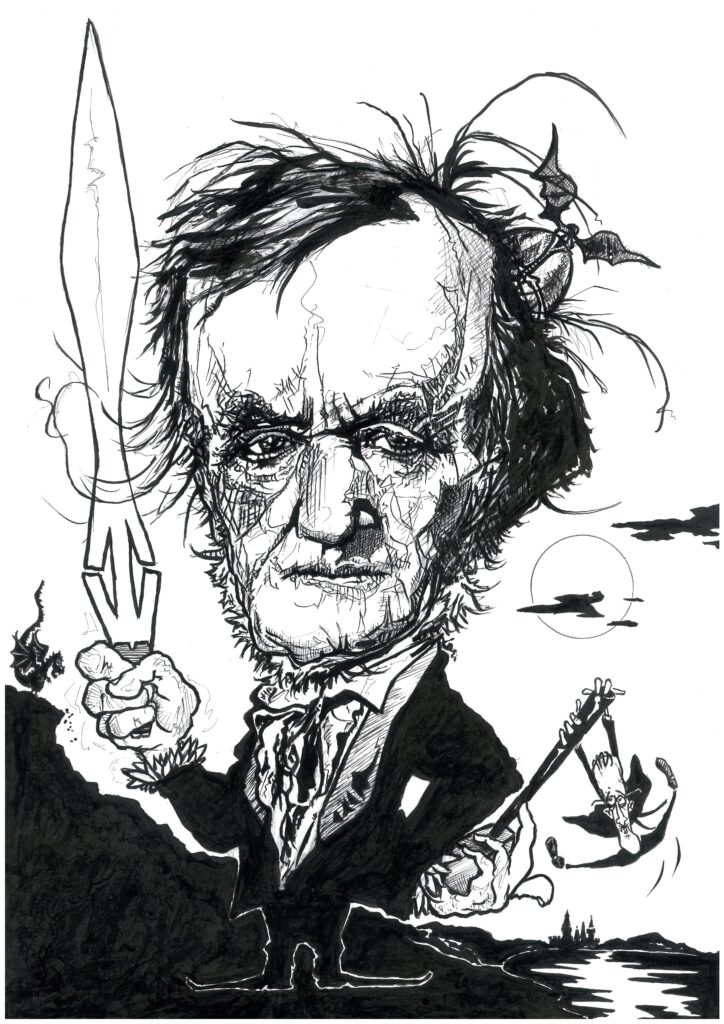
In his Joyce biography, Ellman doesn’t long dwell on Richard Wagner, devoting some small attention to Joyce’s apparently mixed feelings and seemingly studied indifference to the composer: “Joyce had no patience with the current adulation of Wagner, objecting that ‘Wagner puzza di sesso‘ (stinks of sex); Bellini, he said, was far better.” And: “The opera was Tannhäuser, the plot ridiculous to Joyce (‘What sort of a fellow is this Tannhäuser who, when he is with Saint Elizabeth, longs for the bordello of Venusberg, and when he is at the bordello longs to be with Saint Elizabeth?’).” … Apart from a reference to Joyce calling Tristan ‘magical’, that’s about it for Wagner in Ellman’s hands, and that includes the new and revised edition of James Joyce published in 1982. And yet, in 1981, a young American scholar, Timothy Peter Martin, had published his dissertation “The Influence Of Richard Wagner And His Music Dramas On The Works Of James Joyce” (University of Pennsylvania), followed a decade later with his book Joyce And Wagner (CUP). It is now generally accepted that Wagner was a major influence on Joyce. From the Penn Libraries ‘Abstract’ of Martin’s thesis:
